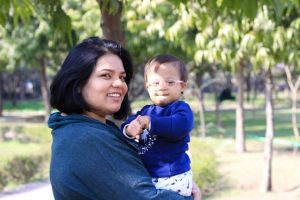
Speech Delay in Toddlers
Speech Delay in Toddlers
The age at which children first learn language and begin talking can vary, much like other abilities and achievements. Parents who have some knowledge of speech and language development can determine whether there is a need for concern. Speech delay is a common problem that affects many children. It occurs when a child’s speech and language development is slower than expected for their age.
The most typical types of developmental delay include language delays. One out of every five kids will develop their language skills later than other kids their age. Some kids struggle with behaviour because they feel irritated with not being able to articulate their needs or wants.
Simple speech hiccups can occasionally occur. They might get better by themselves or with a little extra assistance from family. Spend lots of time playing, reading to, and conversing with your infant or toddler. Encourage your child to “speak” to you using gestures or sounds. In some situations, a speech and language therapist will be more necessary to assist your child in learning to communicate and get a proper speech therapy.
Delays can occasionally be a symptom of a more significant issue, such as hearing loss, other developmental delays, or even autism spectrum disorder (ASD). Early language difficulties may also indicate a learning issue that won’t necessarily be recognised until school-age. If you are worried about your child’s speech language development, it is crucial to get him/her examined.
While there is no single cause of speech delay in children, there are several factors that may contribute to it. In this blog, we will discuss some of the most common causes of speech delay in children. This blog is all about the point of views of a few speech therapists in India.
Milestones of speech & language development for 0-1 year old
The first words a newborn says are like music to a parent’s ears. But how can you tell if your child is developing his/her speech and language normally?
General milestones can act as a guide to typical speech and language development, even though every child learns to speak at his or her own pace. Parents, doctors and other healthcare professionals can use these milestones to identify when a kid may require more assistance.
Your kid might by the end of three months:
- Grin when you see me.
- Make gurgling noises
- When addressed to, remain silent or grin; appear to know your voice
- For various requirements, cry differently.
Your kid might by the end of a year:
- when playing with you or when left alone, make gurgling noises
- Talk and make different noises.
- Using voice to convey happiness and discomfort
- He or she should turn their eyes toward the sound.
- Pay attention to any shifts in your voice tone.
- Take note of the noises some toys make.
- Listen to the music
- Attempt to mimic speech sounds.
- utter a few words like “dada,” “mama,” and “oh no.”
- Recognize simple directions like “Come here”
- Recognize words for everyday objects, such “shoe”
- Turn to face the direction of the sounds.
Milestones of speech & language development for 1-2 year old
Your youngster might towards the end of the first 18 months:
- Know the names of well-known individuals, things, and bodily parts.
- Observe straightforward cues and gestures.
- utter up to ten words.
By the end of 24 months, your child might:
- Use simple phrases, such as “more milk”
- Ask one- to two-word questions, such as “Go bye-bye?”
- Follow simple commands and understand simple questions
- Speak about 50 or more words
- Speak well enough to be understood at least half the time by you or other primary caregivers
Top signs of speech delay in toddlers
The earliest indication of a speech delay could be if a newborn isn’t cooing or making other sounds at two months old. Most infants can speak simple words like “mama” or “dada” by the age of 12 months. Older toddlers who have speech delays include those who:
- Age 2: fail to use 25 words or more
- Uses no unusual two-word expressions or noun-verb combinations as of age two and a half.
- Age 3: doesn’t use at least 200 words, doesn’t ask for items by name, and even when you live with them, they are difficult to comprehend.
- Unable to speak previously acquired words at any age. Read a detail blog on speech dealy here.
Causes of speech delay in toddlers
There are many significant milestones during the early years of childhood. The first time your infant or toddler speaks is one of the major milestones. It makes sense that many parents might worry about their toddler’s speech development.
There are two distinct but linked groups for speech development.
- The first is language processing, which encompasses both expressive language production and receptive language understanding.
- The second category is articulation, which is the capacity for speaking clearly.
Either category may have issues alone or simultaneously.
Many factors might impede or postpone a toddler’s speech development. While some do warrant concern, others are simple to resolve. Physical disabilities that make it difficult for your toddler to appropriately form words or developmental problems that hinder the area of your child’s brain that aids in word interpretation and processing can also be contributing factors. Sometimes mild hearing issues or recurrent ear infections can contribute to your toddler’s “late talker” status.
Does a speech and language delay differ?
According to Zainab Ismail of theslpinthecity “When someone novice, hears the word “speech therapist” it is right for them to assume that the terms “speech” and “language” are one and same. While Speech is a spoken output which in turn, is the result of systematic interplay between mechanisms namely, respiration,, phonation, resonation and articulation. Language on the under hand is the to and fro exchange of information and ideas.
It is a means of communication and encompasses much more meaning than a repertoire of speech sounds.
“If language is the “programme”, then speech are the “codes” you need to successfully run this programme.”
Both speech and language development follow a typical chronology in terms of achieving age-appropriate milestones. These co-occur and develop simultaneously. Having understood the difference between the two, delays in speech and language can also be distinctly defined.
Speech delay reflects a delay in achieving articulatory success or the production the phonemes (smallest unit of sound) in a given language. Speech sound disorders is the umbrella term used to depict conditions that affect the processing, articulation and production of speech sounds. Language delay encompasses delayed achievement of communication milestones (age referenced norms to track the child’s development in areas of receptive and expressive abilities).
It means the child may have a difficulty in both understanding what is being said and how he/she uses spoken language. Though speech and language delays are closely related and mistakenly interchanged, a fine difference between the two exists. In such a scenario, Speech language pathologists who are trained professionals can help distinctly identify and correctly diagnose the problem.”
How are speech and language delays diagnosed?
Manasa RB of happycrisps says “Speech and language delays are prevalent these days, especially due to a number of factors such as, decreased interaction with peers, increased screen time, and also increased awareness of parents and teachers about the same.
Speech and language delays are diagnosed by a speech language pathologist who would use informal and formal measures to arrive at the diagnosis. To arrive at a Speech Language Assessment Session, the speech language pathologist would interact with the child, observe the parents interact with the child , talk to the parents and obtain all information related to communication and other interactions at home.
The use of certain formal tools and scales may also be employed to identify the functioning level of the child.
The speech language pathologist may also make referrals to other professionals such as a developmental paediatrician, an occupational therapist, a special needs educator etc depending on the need.
“Once a diagnosis is arrived at, the speech language pathologist may make recommendations to the family, which could include attending speech language therapy and other interventions, as deemed necessary.“
How does speech language therapy help a toddler?
Toddler hood is a stage where children get to learn a lot of things and their development takes place rapidly. We refer to this period as critical period. In addition to that, based on research, toddlers with language delay tend to exhibit increased and frequent tantrums.
“So for toddlers with language delay , speech therapy is beneficial as it improves their communication skills and thereby reducing tantrums & frustration.”
It also helps in improving social skills , play skills and early literacy skills preparing them for school. According to Saleth Monica of sol_speechtherapy.
For how long does a toddler with speech delay need speech language therapy?
Duration of Speech Language Therapy for a toddler with speech delay depends on the degree of delay and the causative and co-occurring problems like hearing difficulty, attention deficit, psychosocial issues and the environment where the child is growing.
“As the child grows biologically, speech language therapy would focus to bridge the gap between the developmental and biological age.”
The strategies that are engaged in structured sessions needs to be carried over to the home or school environment. This determines how fast we can bridge the gap. If the speech delay is due to stimulation and environmental issues, the duration required is considerable low and can quickly mainstream the child as any typically developing child, says Sweta of speech.therapist.mommy.
How can parents help their child with speech/language delay?
Pratiksha Gupta, Founder & CEO of 1Special Place opines, “In the words of Jane D Hull,
” At the end of the day, the most overwhelming key to a child’s success, is the positive involvement of parents.”
Parents play a crucial role in the speech and language development of kids. A parent is the perfect partner in communication which is a two-way process. Here are some simple tips using which a parent can help their child who has a speech & language delay:
-
Play with your child. Get involved and play. Make it fun, hands on and engaging. Use your child’s interest and spend time playing with his/her favourite toy.
-
Read to your child. Reading big bold books with repetitive words helps in building vocabulary and gives opportunities for children to learn the language rules.
-
Sing to your child. Singing songs and rhymes in your native language has huge benefits. Children can learn new concepts, words and more in a sing-song fun way!
-
Reduce screen time. Passive screen time is harmful for kids. Supervision and regularization are critical. Children should be exposed to minimal screen time and you should make it an engaging activity where you talk and discuss what the child is watching. Read more here about screen time in infants and toddlers.“
What resources can help a child with a speech/language delay?
There are plenty of resources that can help a child with speech and language delay. Here is a general list.
-
Toys : Depending on the age of the child you should choose a toy which stimulates learning and imagination. Some wonderful options are dolls and doll houses, wooden blocks, cars, trains and other vehicles, kitchen toys, puzzles and more. Don’t let gender bias rule your mind while playing with your child. Read more here about toys for speech and language development.
-
Books : There is a large variety of books to choose from. Go for books which have simple clear images with bold colours. Touch& feel, Lift the flap, puppet books are a few examples. Read more here about books that can help a child talk.
-
Worksheets : Hands on worksheets that build on specific skills like vocabulary building, sentence structure, grammatical concepts and more should be used. Find some amazing worksheets for your child here.
-
Boom Cards : Boom Cards offer an exciting interface for kids to learn various concepts that help them talk. Click here to checkout Boom Cards by 1SpecialPlace.
-
Apps: We all use iPads for our day-to-day life. Why not use it for Speech Therapy too? . Learning to talk can be made more fun at home. iPad has many apps that you can use. Check our favourite ones here. This excerpt by Pratiksha Gupta
With our exclusive Online Speech therapy india exercises and best online speech therapist India, receive cutting-edge treatment from the comfort of your own home. At 1SpecialPlace you have the right to be confident in your communication and to learn from the finest.
- News of the month for March 2024 - April 16, 2024
- News of the month for Jan 2024 - January 29, 2024
- Shining a Light on the Unseen: The Importance of Syndrome Awareness - January 23, 2024



Leave a Comment
(2 Comments)
It caught my attention when you said one sign of speech delay is if the toddler is difficult to comprehend even when we live with them. I cannot understand what my little brother usually says because, to me, he sounds like he’s always mumbling. I’ll ask my parents if they noticed the same and see if we can get a pediatrician to check if he has speech delay.
Hi Elaina,
Here are some free screening tests that you may find useful.
https://1specialplace.com/services/screening-tests/
Categories
Recent Posts